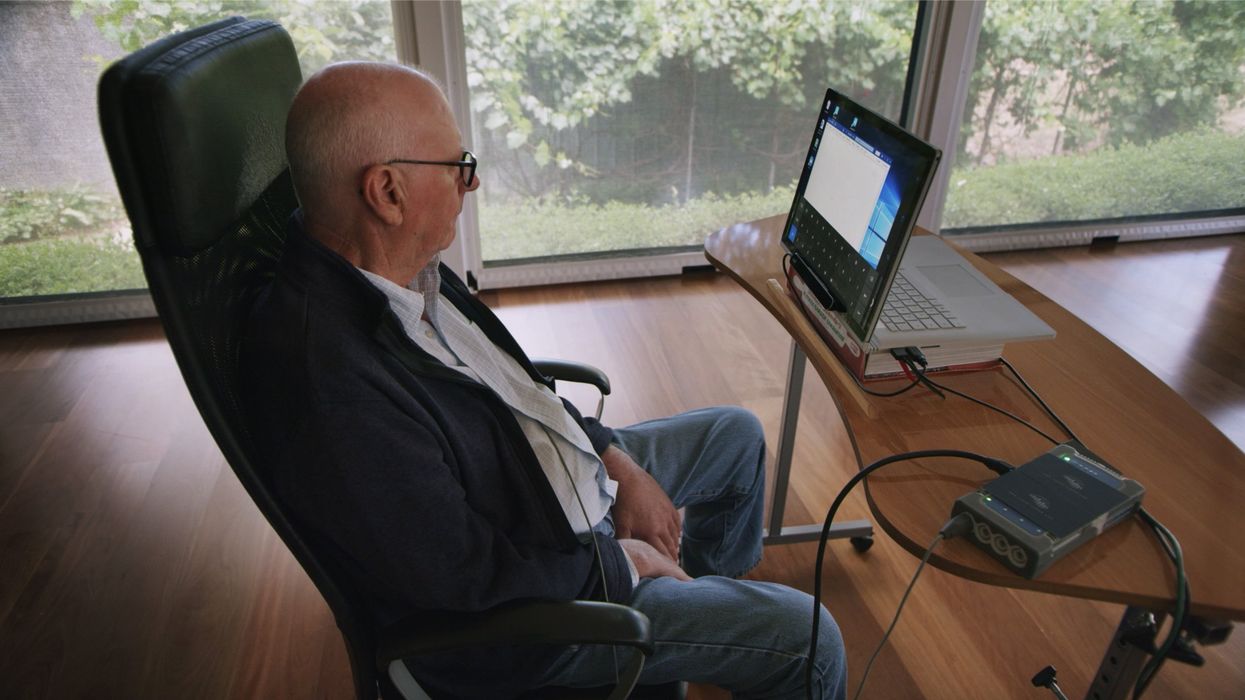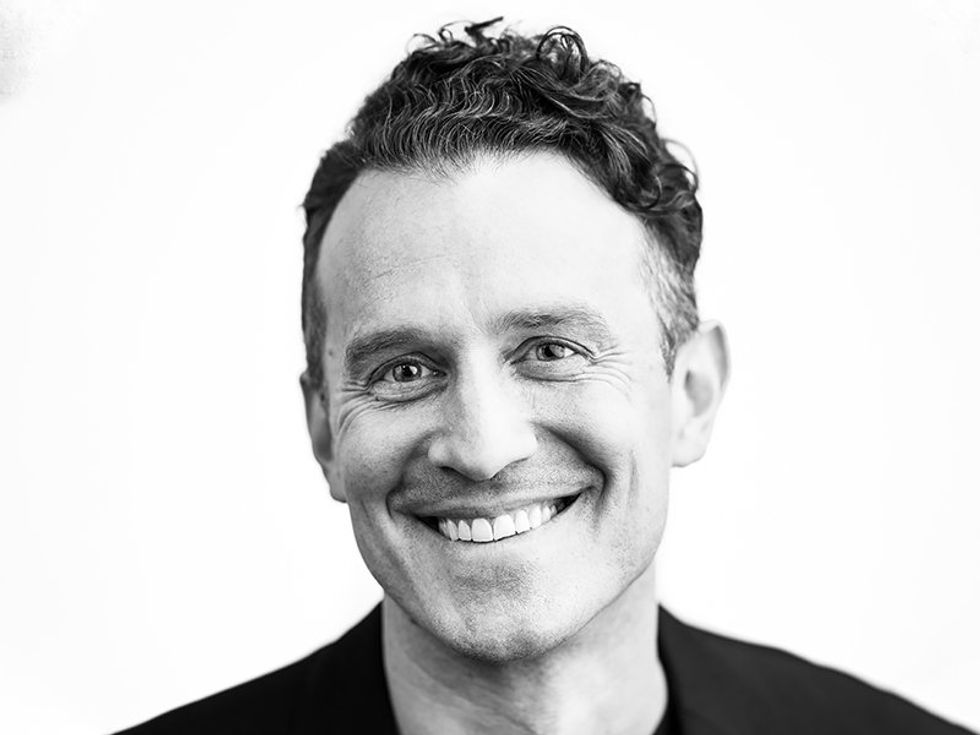How to Use Thoughts to Control Computers with Dr. Tom Oxley

Leaps.org talks with Dr. Tom Oxley, founding CEO of Synchron, a company that's taking a unique - and less invasive - approach to "brain-computer interfaces" for patients with ALS and other mobility challenges.
Tom Oxley is building what he calls a “natural highway into the brain” that lets people use their minds to control their phones and computers. The device, called the Stentrode, could improve the lives of hundreds of thousands of people living with spinal cord paralysis, ALS and other neurodegenerative diseases.
Leaps.org talked with Dr. Oxley for today’s podcast. A fascinating thing about the Stentrode is that it works very differently from other “brain computer interfaces” you may be familiar with, like Elon Musk’s Neuralink. Some BCIs are implanted by surgeons directly into a person’s brain, but the Stentrode is much less invasive. Dr. Oxley’s company, Synchron, opts for a “natural” approach, using stents in blood vessels to access the brain. This offers some major advantages to the handful of people who’ve already started to use the Stentrode.
The audio improves about 10 minutes into the episode. (There was a minor headset issue early on, but everything is audible throughout.) Dr. Oxley’s work creates game-changing opportunities for patients desperate for new options. His take on where we're headed with BCIs is must listening for anyone who cares about the future of health and technology.
Listen on Apple | Listen on Spotify | Listen on Stitcher | Listen on Amazon | Listen on Google
In our conversation, Dr. Oxley talks about “Bluetooth brain”; the critical role of AI in the present and future of BCIs; how BCIs compare to voice command technology; regulatory frameworks for revolutionary technologies; specific people with paralysis who’ve been able to regain some independence thanks to the Stentrode; what it means to be a neurointerventionist; how to scale BCIs for more people to use them; the risks of BCIs malfunctioning; organic implants; and how BCIs help us understand the brain, among other topics.
Dr. Oxley received his PhD in neuro engineering from the University of Melbourne in Australia. He is the founding CEO of Synchron and an associate professor and the head of the vascular bionics laboratory at the University of Melbourne. He’s also a clinical instructor in the Deepartment of Neurosurgery at Mount Sinai Hospital. Dr. Oxley has completed more than 1,600 endovascular neurosurgical procedures on patients, including people with aneurysms and strokes, and has authored over 100 peer reviewed articles.
Links:
Synchron website - https://synchron.com/
Assessment of Safety of a Fully Implanted Endovascular Brain-Computer Interface for Severe Paralysis in 4 Patients (paper co-authored by Tom Oxley) - https://jamanetwork.com/journals/jamaneurology/art...
More research related to Synchron's work - https://synchron.com/research
Tom Oxley on LinkedIn - https://www.linkedin.com/in/tomoxl
Tom Oxley on Twitter - https://twitter.com/tomoxl?lang=en
Tom Oxley TED - https://www.ted.com/talks/tom_oxley_a_brain_implant_that_turns_your_thoughts_into_text?language=en
Tom Oxley website - https://tomoxl.com/
Novel brain implant helps paralyzed woman speak using digital avatar - https://engineering.berkeley.edu/news/2023/08/novel-brain-implant-helps-paralyzed-woman-speak-using-a-digital-avatar/
Edward Chang lab - https://changlab.ucsf.edu/
BCIs convert brain activity into text at 62 words per minute - https://med.stanford.edu/neurosurgery/news/2023/he...
Leaps.org: The Mind-Blowing Promise of Neural Implants - https://leaps.org/the-mind-blowing-promise-of-neural-implants/

Tom Oxley
Here's how one doctor overcame extraordinary odds to help create the birth control pill
Dr. Percy Julian had so many personal and professional obstacles throughout his life, it’s amazing he was able to accomplish anything at all. But this hidden figure not only overcame these incredible obstacles, he also laid the foundation for the creation of the birth control pill.
Julian’s first obstacle was growing up in the Jim Crow-era south in the early part of the twentieth century, where racial segregation kept many African-Americans out of schools, libraries, parks, restaurants, and more. Despite limited opportunities and education, Julian was accepted to DePauw University in Indiana, where he majored in chemistry. But in college, Julian encountered another obstacle: he wasn’t allowed to stay in DePauw’s student housing because of segregation. Julian found lodging in an off-campus boarding house that refused to serve him meals. To pay for his room, board, and food, Julian waited tables and fired furnaces while he studied chemistry full-time. Incredibly, he graduated in 1920 as valedictorian of his class.
After graduation, Julian landed a fellowship at Harvard University to study chemistry—but here, Julian ran into yet another obstacle. Harvard thought that white students would resent being taught by Julian, an African-American man, so they withdrew his teaching assistantship. Julian instead decided to complete his PhD at the University of Vienna in Austria. When he did, he became one of the first African Americans to ever receive a PhD in chemistry.
Julian received offers for professorships, fellowships, and jobs throughout the 1930s, due to his impressive qualifications—but these offers were almost always revoked when schools or potential employers found out Julian was black. In one instance, Julian was offered a job at the Institute of Paper Chemistory in Appleton, Wisconsin—but Appleton, like many cities in the United States at the time, was known as a “sundown town,” which meant that black people weren’t allowed to be there after dark. As a result, Julian lost the job.
During this time, Julian became an expert at synthesis, which is the process of turning one substance into another through a series of planned chemical reactions. Julian synthesized a plant compound called physostigmine, which would later become a treatment for an eye disease called glaucoma.
In 1936, Julian was finally able to land—and keep—a job at Glidden, and there he found a way to extract soybean protein. This was used to produce a fire-retardant foam used in fire extinguishers to smother oil and gasoline fires aboard ships and aircraft carriers, and it ended up saving the lives of thousands of soldiers during World War II.
At Glidden, Julian found a way to synthesize human sex hormones such as progesterone, estrogen, and testosterone, from plants. This was a hugely profitable discovery for his company—but it also meant that clinicians now had huge quantities of these hormones, making hormone therapy cheaper and easier to come by. His work also laid the foundation for the creation of hormonal birth control: Without the ability to synthesize these hormones, hormonal birth control would not exist.
Julian left Glidden in the 1950s and formed his own company, called Julian Laboratories, outside of Chicago, where he manufactured steroids and conducted his own research. The company turned profitable within a year, but even so Julian’s obstacles weren’t over. In 1950 and 1951, Julian’s home was firebombed and attacked with dynamite, with his family inside. Julian often had to sit out on the front porch of his home with a shotgun to protect his family from violence.
But despite years of racism and violence, Julian’s story has a happy ending. Julian’s family was eventually welcomed into the neighborhood and protected from future attacks (Julian’s daughter lives there to this day). Julian then became one of the country’s first black millionaires when he sold his company in the 1960s.
When Julian passed away at the age of 76, he had more than 130 chemical patents to his name and left behind a body of work that benefits people to this day.
Therapies for Healthy Aging with Dr. Alexandra Bause
My guest today is Dr. Alexandra Bause, a biologist who has dedicated her career to advancing health, medicine and healthier human lifespans. Dr. Bause co-founded a company called Apollo Health Ventures in 2017. Currently a venture partner at Apollo, she's immersed in the discoveries underway in Apollo’s Venture Lab while the company focuses on assembling a team of investors to support progress. Dr. Bause and Apollo Health Ventures say that biotech is at “an inflection point” and is set to become a driver of important change and economic value.
Previously, Dr. Bause worked at the Boston Consulting Group in its healthcare practice specializing in biopharma strategy, among other priorities
She did her PhD studies at Harvard Medical School focusing on molecular mechanisms that contribute to cellular aging, and she’s also a trained pharmacist
In the episode, we talk about the present and future of therapeutics that could increase people’s spans of health, the benefits of certain lifestyle practice, the best use of electronic wearables for these purposes, and much more.
Dr. Bause is at the forefront of developing interventions that target the aging process with the aim of ensuring that all of us can have healthier, more productive lifespans.


